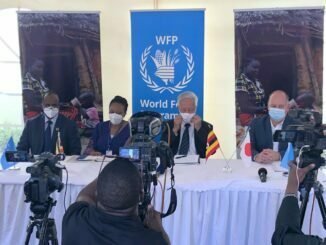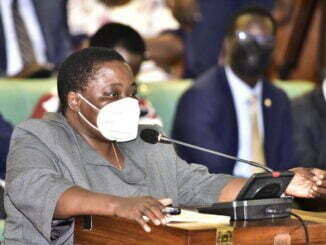
Khartoum, Sudan | By Michael Wandati | Sudan’s ongoing year-long conflict has not only worn out the patience of the international community but has also been overshadowed by newer conflicts, leaving the African nation in a state of desperation.
While much of the responsibility lies with the warring factions—the Sudan Armed Forces (SAF) and the Rapid Support Forces (RSF)—for their failure to agree on a sustainable ceasefire, the global community’s focus has been minimal.
During a webinar organized this week by the Inter-Agency Working Group—East and Central Africa, aimed at coordinating responses to humanitarian crises, it was highlighted that a staggering 18 million Sudanese are struggling to access basic food necessities.
Humanitarian workers have sounded alarm bells, emphasizing that Sudan is not only grappling with the world’s largest displacement crisis but also facing the most significant internal displacement crisis for children, with nearly 5 million children forcibly displaced.
Eatizaz Yousif, Country Director of the International Rescue Committee (IRC) in Sudan, emphasized that the nation is confronting unprecedented levels of displacement and hunger, with almost half of its 45 million population in dire need of humanitarian aid.
“The war has created education and health disasters with 10 million children dropping out of school, while 75 per cent of the health facilities are either destroyed or forced to close at a time when 11 million people need emergency health intervention,” said Ms Yousif on April 9, 2024 in a virtual meeting.
This week, humanitarian agencies grappling with the daunting task of delivering aid highlighted a concerning trend: donors seem to have shifted their attention to crises in Gaza or Ukraine, leaving Sudan with only about 30 per cent of the required aid pledged, much of which has yet to materialize.
Also Read: US President Joe Biden reaffirms backing for Israel in wake of Iran’s attack
The United Nations, spearheading the funding appeal, underscores Sudan’s urgent need for two critical components: a $2.7 billion Humanitarian Needs and Response Plan targeting 14.7 million people within Sudan and an additional $1.4 billion Regional Refugee Response Plan aimed at assisting 2.7 million individuals in five neighboring nations: Chad, South Sudan, Ethiopia, Egypt, and the Central African Republic.
According to UN estimates, a staggering 8.5 million people have been forcibly displaced, with approximately 1.5 million residing in under-resourced camps across Sudan and neighboring countries such as Chad, the Central African Republic, Egypt, and South Sudan.
The humanitarian situation is dire, with famine looming as the conflict has disrupted two crucial planting seasons typically commencing in April and May, coinciding with the long rains.
Since the eruption of conflict on April 15, 2023, millions of individuals have endured relentless fighting, encompassing airstrikes, bombings, shootings, and assaults.
Of paramount concern is the severe lack of access to essential healthcare services for the displaced population. A recent report by medical charity group Doctors Without Borders (MSF), released on April 8, underscores Sudan’s dwindling time to save those in need of medical intervention.
MSF highlights widespread looting and persistent attacks on individuals, including instances of sexual violence, as defining features of the conflict.
Pregnant women bear a particularly heavy burden due to limited access to healthcare. Over the past year, MSF has facilitated more than 8,400 deliveries and performed 1,600 caesarean sections in response to this pressing need.
“Patients are dying due to violence-related injuries and preventable illnesses; children are perishing due to malnutrition. Vaccines are running out, and there have already been outbreaks of deadly diseases such as cholera and measles,” the MSF situational report read.
Dr Christos Christou, the international President of MSF said that Sudan is one of the worst crises the world has seen for decades.
“There is no doubt that there are enormous challenges in Sudan, but they are not insurmountable. It is possible to respond – and we know this because we are there,” said Dr Christou noting that MSF has 30 health facilities in 10 states in Sudan.
Also Read: At least 300 Ugandans trapped in war-torn Sudan’s Khartoum
These regions, including Khartoum, Al Jazirah, White and Blue Nile, Al Gedaref, West Darfur, North, South, and Central Darfur states, Red Sea state, and Kassala, have witnessed a significant influx of displaced populations.
Unfortunately, civilians have often found themselves caught in the crossfire between powerful factions, namely the Sudan Armed Forces (SAF) and the Rapid Support Forces (RSF). Both sides have manipulated humanitarian aid as a tool of coercion: those perceived as not supporting their cause are denied access to essential assistance.
Humanitarian agencies have acknowledged that some aid has been obstructed, diverted from its intended destinations, or even looted to support armed groups. Tragically, civilians suspected of affiliating with opposing factions have been subjected to atrocities including killings, sexual violence, mutilation, starvation, and forced displacement, as highlighted in a recent report by human rights watchdog Amnesty International.
In Sudan, the US State Department had previously declared occurrences of war crimes last year, a conclusion corroborated by findings from Amnesty International and other human rights organizations.



